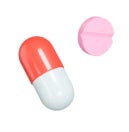SingHealth Duke-NUS Academic Medical Centre will NEVER ask you to transfer money over a call. If in doubt, call the 24/7 ScamShield helpline at 1799, or visit the ScamShield website at www.scamshield.gov.sg.
Iron Supplements
Sangobion, Hemoplex, Floron, Maltofer
Uses
What is Iron supplements for?
Iron is a type of mineral naturally found in some foods that helps the body to produce red blood cells. It is used to treat or prevent iron deficiency anemia, a condition that occurs when the body has insufficient healthy red blood cells to provide oxygen to the body. Iron deficiency anemia may be due to a poor diet, excessive bleeding (e.g. heavy menses), or as a result of other medical problems (e.g. chronic kidney problems).
During pregnancy, iron supplementation helps meet the increased iron needs of both the mother and the developing baby.
Iron supplements may be available on its own (e.g. Iron Polymaltose), or as a combination product (e.g. Iron Gluconate Co).
How should I take or use Iron supplements?
- Take this medication as prescribed by your healthcare professional
- Do not stop taking your medications without checking with your healthcare professional
- This medicine should be taken before food, on an empty stomach, for better absorption. However, for iron polymaltose drops/tablets, it should be taken with or after food for better absorption. The iron polymaltose drops may be mixed with other liquids like fruit juices or milk.
What should I do if I forget to take or use Iron supplements?
If you miss a dose, take the missed dose as soon as you remember. If it is almost time for your next dose, take only the usual dose. Do not double your dose or use extra medication to make up for the missed dose.
Precaution
What precautions should I take when taking or using Iron supplements?
Before starting on this medication, inform your healthcare professional if you:
- Are allergic to this medication, or any of the other ingredients in this medication
- Have a medical condition called thalassaemia, a type of blood disorder
- Have a medical condition called haemochromatosis where there is a high iron level in the body
- Are taking any other medications, including supplements, traditional medications and herbal remedies
What food or medication should I avoid when I take or use Iron supplements?
Space iron supplements (exception: iron polymaltose) 2 hours apart from milk and other calcium rich foods or supplements.
Do not take iron supplements (exception: iron polymaltose) and certain medications such as antacids, antibiotics (e.g. Quinolones - Ciprofloxacin, Tetracyclines), medications used to treat Parkinson's disease (e.g. Levodopa), or Levothyroxine at the same time. It should be spaced at least 2 to 4 hours apart. You may check with your healthcare professional for more information.
Side Effects
What are some common side effects of Iron supplements?
- Stomach upset or vomiting
- If these side effects occur when the medication is taken on an empty stomach, take it with meals or a snack instead
- Constipation
- Drink more water and eat more high- fibre foods such as vegetables, fruits and whole grains
- Darkening of stools
- This side effect is harmless
The symptoms of a drug allergy include one or more of the following:
- Swollen face/eyes/lips/tongue
- Difficulty in breathing
- Itchy skin rashes over your whole body
If you experience any of these symptoms, you should stop your medication and see your healthcare professional immediately.
Handling
How should I store Iron supplements?
- Keep away from children
- Keep in a cool, dry place, away from direct sunlight
- Store at room temperature
Throw away all expired medications.
How do I throw away Iron supplements safely?
Pack this medication into a black trash bag and seal it tightly before throwing into the rubbish chute or bin.
Disclaimers
If you take more than the recommended dose, please seek medical advice immediately. The information provided on this page does not replace information from your healthcare professional. Please consult your healthcare professional for more information.
This article is jointly developed by members of the National Medication Information workgroup. The workgroup consists of cluster partners (National Healthcare Group, National University Health System, and SingHealth), community pharmacies (Guardian, Unity, and Watsons), and the Pharmaceutical Society of Singapore. The content does not reflect drug availability and supply information in pharmacies and healthcare institutions. You are advised to check with the respective institutions for such information.
Last Updated on December 2020

Need More Medicine?
Use Medicine Order Service on HealthBuddy.

Medicines Reminder
Get reminders and chart progress on HealthBuddy.
© 2025 SingHealth Group. All Rights Reserved.
















































